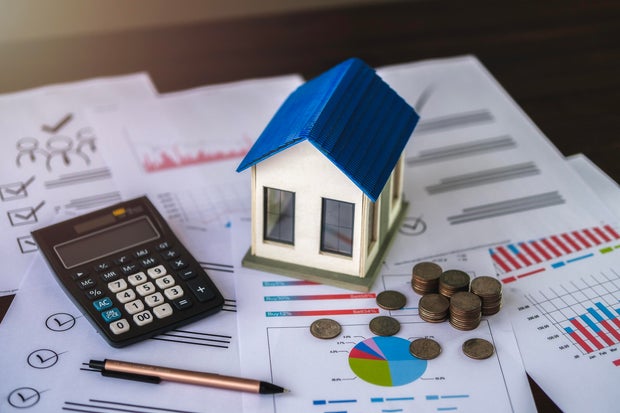 Homeowners should calculate their potential monthly home equity loan costs before securing the financing.
Getty Images
Homeowners should calculate their potential monthly home equity loan costs before securing the financing.
Getty Images
A home equity loan is traditionally one of the less expensive ways to borrow money (and it's one of the only ways to borrow a large, six-figure sum). With the home functioning as collateral, lenders typically feel less risk in the borrowing exchange, and that confidence is reflected in lower interest rates for the homeowner. Those rates have been coming down consistently for home equity loans after declining for much of 2024 and into 2025. At an average of just 8.36% now, home equity loans are much more affordable than personal loans (with an average rate of over 12% now) and credit cards (just under a record high of 23%). Only a home equity line of credit (HELOC), with a rate of just under 8%, is cheaper (and that rate is variable and subject to rise or fall over time, while home equity loan rates are fixed).
Understanding this evolution in rates, then, and the reality of an average home equity amount over $300,000, some homeowners may be contemplating using a home equity loan to access a relatively smaller sum of $15,000. This amount of money can help finance major home repairs or projects, pay down high-rate debt, or more, and it can be done so while leaving a substantial equity buffer in the home for potential use in the future. Before getting started, however, homeowners should precisely calculate their potential repayment costs. Thanks to the fixed home equity loan rate, this is simple to do. Below, we'll do the math.
See how low a home equity loan rate you'd be eligible for here.
How much does a $15,000 home equity loan cost per month in 2025?According to Bankrate, average home equity loan rates vary depending on the length of the repayment. Here, then, is what a $15,000 home equity loan will cost per month if secured now, at the average rates available in May 2025:
5-year home equity loan at 8.36%: $306.74 per month10-year home equity loan at 8.51%: $186.06 per month15-year home equity loan at 8.41%: $146.92 per monthSo, on the surface, a $15,000 home equity loan calculated at today's average rates will cost borrowers between $147 and $307 monthly, approximately. But those rates could look different for you, depending on your credit score and profile. If your credit is in good shape, you may be offered lower rates and better terms and vice versa.
It's important, then, to first check your credit score. If it's in good shape, then you can feel comfortable proceeding with a home equity loan, but if it needs work, it may be better to focus on that as the first step.
Get started with a home equity loan online today.
What are my home equity loan alternatives?While a home equity loan remains one of your most affordable ways to borrow home equity in today's economy, it's not the only way to do so. Here are three home equity loan alternatives that may be worth researching now:
HELOCs: A HELOC functions as a revolving line of credit in which interest-only payments will be required during the draw period. But the rate here is variable and can rise and fall based on market conditions, so be sure to crunch your repayments on the rates that are available right now as well as what they could be in the future, to better determine long-term affordability.
Cash-out refinances: For those with a substantial amount of equity in their home, this option could be worth researching now. It involves taking out a new mortgage loan larger than your current balance. You then pay off your balance and keep the difference between the two as cash. It will require exchanging your current mortgage rate for what's available today, however, so it may not be beneficial for those with rates substantially lower than today's averages.
Reverse mortgages: Generally only applicable to homeowners 62 and older, this could be worth exploring for older homeowners who can't afford to make monthly repayments. In this situation, homeowners will receive monthly payments from their accumulated equity. They'll need to pay it back, however, if the homeowner dies or if the home is sold.
The bottom lineA $15,000 home equity loan comes with monthly affordable payments for homeowners in today's rate climate. And because it won't subtract too much equity from the average six-figure sum most homeowners have now, it could be the smartest way to borrow $15,000 worth of equity now. But with alternatives like HELOCs, cash-out refinances and reverse mortgages potentially more applicable to your unique circumstances, it's worth taking the time to research each to better understand which makes the most sense for you now and in the future.
Matt Richardson






